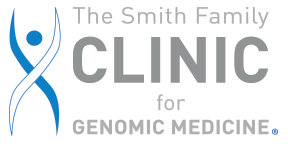Alabama family finds answers at Smith Family Clinic for Genomic Medicine
“Years went by, and we knew nothing.” This is a common phrase heard at the Smith Family Clinic for Genomic Medicine. Usually from a patient or family member who has spent years searching for a diagnosis for themselves, or a loved one.
Carol Barnette is no stranger to this, spending more than 50 years looking for answers for her son.
“I refused to accept that answer”
A lover of sweets and a whiz at Wheel of Fortune, Robert “Bob” Barnette was born at a time when genetic testing was still new to the medical field, so when he began showing signs of developmental delay, only one diagnosis seemed to fit – at least in his pediatrician’s mind.
“When he was 3-years-old, the doctor said ‘Your son is retarded.’ Just like that,” Carol explained. “I was, of course, extremely angry. I refused to accept that answer.”
Robert developed diabetes and high blood pressure in his early forties, which led Carol to wonder if these were symptoms of a particular disorder and if other family members were also at risk.
“I wanted to know what else to expect,” she explained. “My two nephews had just entered their 30s and I wanted to make sure that this wasn’t something that they would have to worry about with their children as well.”
Carol’s daughter-in-law, a doctor, recommend she take Robert to a geneticist. Much to her surprise, she found one in Huntsville, Ala.
“I did an internet search for ‘geneticist’ and didn’t think that I would find one here but I did,” said Carol. “And then I found out that he is a world-renowned geneticist.”
Carol’s search led her to David Bick, MD, clinical geneticist at the Smith Family Clinic for Genomic Medicine. The HudsonAlpha Institute for Biotechnology opened the Smith Family Clinic for Genomic Medicine to use genome sequencing and other genetic testing to diagnose patients who may have undiagnosed or misdiagnosed conditions. Potential patients can be referred to the office by their physicians.
Williams syndrome?
With advances in sequencing and analysis technology, genetic testing is becoming more common in medical practice, giving physicians the tools to work collaboratively with geneticists and bring answers to patients like Robert.
Robert’s physician, Yari Campbell, MD, of Crestwood Medical Center, made a referral to the Smith Family Clinic for Genomic Medicine.
During his visit to the clinic, Robert’s medical and family histories were reviewed, and he had a detailed physical exam. Based on his history and appearance, the clinical team suspected that he had a particular developmental disorder, Williams syndrome.
Genetic testing revealed their suspicions were correct. Robert was diagnosed with Williams syndrome, a developmental disorder that affects 1 in 10,000 people and occurs due to missing genetic material on chromosome 7. Most cases of Williams syndrome develop sporadically and are not inherited. Carol was relieved to know that she was not the cause of her son’s diagnosis.
“It was well worth the money to have him diagnosed,” she said.
Individuals with Williams syndrome commonly have mild to moderate intellectual disability, cardiovascular problems, and distinctive facial features. Symptoms typically appear in childhood and patients can be diagnosed at a young age. However, the genetic testing to diagnose Williams syndrome was still in its early stages when Robert was born.
“I looked at the pictures of other children with Williams syndrome and they looked exactly like Bob did when he was little. It just blows my mind how this can happen,” Carol said.
A roadmap for the future
Williams syndrome is well known and well researched, which means there is an established set of guidelines for adults with the condition. With a diagnosis in hand, the Smith Family Clinic for Genomic Medicine team was able to work with Carol on specific recommendations for Robert to help improve his quality of life.
“Although most genetic diseases do not have a cure, having an answer can still mean so much for a patient,” said Dr. Bick. “With a correct diagnosis, we can develop a treatment plan that is tailored to the patient and help manage their condition, while also providing hope for the future.”
In addition, Carol and Robert have connected other Williams syndrome patients and families, specifically those who compete in the Special Olympics, a year-round sports training and athletic competition for children and adults with intellectual disabilities.
“He’s been competing in the Special Olympics since he was about 20 years old,” said Carol. “He loves bowling and bocce ball.”
Carol hopes that by sharing Robert’s diagnostic journey, she can spread awareness of Williams syndrome and the Smith Family Clinic for Genomic Medicine for other parents.
“I was so in the dark,” Carol said. “I know there are a lot of other mothers out there who feel the same way and have no idea what’s going on. I just hope that I can be an advocate for those who need to know this information.”
The Smith Family Clinic for Genomic Medicine considers patients like Robert heroes. They fight every day, battling unknown diseases and going years without a diagnosis. While in cases like Robert’s, the diagnosis may be suggested by a patient’s history or appearance. In some cases, a patient’s disease is so rare that whole genome sequencing is needed to find an answer.
Thanks to philanthropic support, the Smith Family Clinic for Genomic Medicine is able to offer financial assistance to qualifying patients through the Hero Fund. To learn more about how you can support a hero, visit https://smithfamilyclinic.org/hero/.

